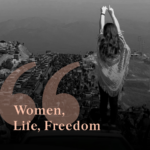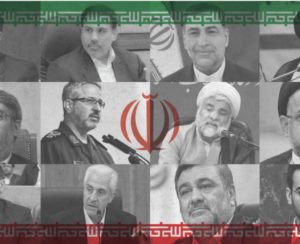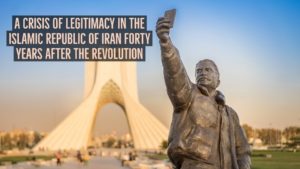Iran’s protest movement on Monday started a concerted effort to hold three days of strikes, with reports of thousands of businesses closed in several parts of the country, CNBC reports. Footage posted to social media shows rows of shuttered shops. Teachers, factory workers and students are staging strikes and sit-ins as well, according to London-based outlet Iran International.
“Nationwide strikes, particularly in key sectors, could be used to put time on the side of protestors while creating chaos and financial issues for the state,” Behnam Ben Taleblu, an Iran expert and senior fellow at the Foundation for Defense of Democracies, told CNBC.
Iranian government-backed hackers targeted nearly two dozen high-profile activists, journalists, diplomats and others in recent months as part of an ongoing espionage effort, two human-rights groups said Monday, Bloomberg reports
 In three cases, hackers gained access to the victims’ emails, contacts and other data, according to Human Rights Watch and Amnesty International, which published the analysis. The hackers also attempted a Google Takeout, which allows users to download their complete Google account including messages, cloud storage and other sensitive information.
In three cases, hackers gained access to the victims’ emails, contacts and other data, according to Human Rights Watch and Amnesty International, which published the analysis. The hackers also attempted a Google Takeout, which allows users to download their complete Google account including messages, cloud storage and other sensitive information.
“Iran’s state-backed hackers are aggressively using sophisticated social engineering and credential-harvesting tactics to access sensitive information and contacts held by Middle East-focused researchers and civil society groups,” said Abir Ghattas, information security director at Human Rights Watch.
Unnerved by nearly three months of spreading protests, Iran’s theocratic regime may be retreating. In their first concession since demonstrations erupted in September after the death of Mahsa Amini for not wearing a “proper” hijab, Iran’s authorities have hinted at the abolition of the religious police force in whose custody she died, The Economist observes:
Ruhollah Khomeini, the founder of the Islamic Republic, called the requirement of women to be veiled the “flag of the revolution”. So the regime’s sudden decision to lower it has been muted. The prosecutor-general, Muhammad Jaafar Montazeri, announced it during a parliamentary committee meeting. Henceforth “judicial confrontation will be the last stage,” he told the assembly. Unspecified “cultural” methods would be adopted instead. In another meeting he said a decision would be taken by mid-December on whether to abolish the mandatory hijab altogether.

Credit: FDD
The authorities have meanwhile been concentrating on battling the protests themselves in a crackdown that has left at least 448 people dead, according to Norway-based group Iran Human Rights, AFP adds.
“The alleged suspension of Iran’s morality police doesn’t mean anything as it had already become irrelevant due to the massive level of women’s civil disobedience and defying hijab-related rules,” said Omid Memarian, a senior Iran analyst at Democracy for the Arab World Now.
As societies across the Muslim Middle East have turned their backs on Islamization and become more secular, Iranians have wanted to follow suit, it adds.
The Iranian regime is facing a unique set of crises: Confronted with strident critique from the world community, it has failed to produce an anti-protest consensus internally and is now resorting to disinformation and diffusion that denounce foreign manipulation of these protests, notes Patricia Karam, the regional director for the Middle East and North Africa at the International Republican Institute. The varied sectors of society joining the protests and their sheer breadth have made them difficult to control, and it is unclear if the regime can withstand this pressure using the same tactics.
 How will it all end? she asks in The Hill. The protestors show no signs of giving up, and the regime shows no signs of capitulating. Yet, while the brutal crackdown ultimately could squash the protests, this will only fuel the anger of ordinary Iranians — women, first and foremost — who are fundamentally opposed to the core tenets of the Islamic Republic.
How will it all end? she asks in The Hill. The protestors show no signs of giving up, and the regime shows no signs of capitulating. Yet, while the brutal crackdown ultimately could squash the protests, this will only fuel the anger of ordinary Iranians — women, first and foremost — who are fundamentally opposed to the core tenets of the Islamic Republic.
But Iran’s clerical rulers are likely to survive protests sweeping the country and could stay in power for years, the chief analyst for Israeli military intelligence said on Monday, prompting his commander to predict the enemy regime would eventually fall, Reuters reports:
“The repressive Iranian regime will, it seems, manage to survive these protests,” said Brigadier-General Amit Saar, who as head of research for Israel’s military intelligence is responsible for national strategic forecasts. “It has constructed very, very strong tools for dealing with such protests,” he told the first public conference by the Gazit Institute. “But I think that even if these protests wane, the reasons (for them) will remain, and thus the Iranian regime has a problem for years to come.”
 But a UK-based Iran expert has dismissed claims that the country’s notorious morality police will be disbanded following a wave of social unrest saying “it’s a distraction.” Nothing is changing concerning the restrictive dress codes for women, which “can still be enforced,” said Mahsa Alimardani, a senior researcher at ARTICLE19.
But a UK-based Iran expert has dismissed claims that the country’s notorious morality police will be disbanded following a wave of social unrest saying “it’s a distraction.” Nothing is changing concerning the restrictive dress codes for women, which “can still be enforced,” said Mahsa Alimardani, a senior researcher at ARTICLE19.
Unlike previous protests driven by economic or electoral grievances, the current uprising demands regime change, other observers suggest.
Reformist analyst Abbas Abdi openly said in an interview in Tehran that protests in 2009 did not call for regime change, but “the demand of current protesters is to change the regime. They do not know what will happen next, but they believe whatever that might take place will be better than the current situation.”
 Masih Alinejad’s My Stealthy Freedom campaign has built up millions of followers on her social media accounts, ABC News reports.
Masih Alinejad’s My Stealthy Freedom campaign has built up millions of followers on her social media accounts, ABC News reports.
Ladan Boroumand, co-founder of Abdorrahman Boroumand Center, a Washington-based organisation that advocates for human rights in Iran, says an Alinejad Facebook post sparked “one of Iranian civil society’s biggest challenges to the regime yet”.
The false news claiming victory for the so-called abolition of the morality police hurts the ongoing revolution, Masih told ABCNewsLive (below), adding that when dictatorships like the Iranian regime are in trouble, they spread propaganda and obfuscation.
 “She [Alinejad] and the women who posted selfies sans hijab on the page created an alternative public sphere that was immune to police assault,” Boroumand wrote in September.
“She [Alinejad] and the women who posted selfies sans hijab on the page created an alternative public sphere that was immune to police assault,” Boroumand wrote in September.
There’s a certain reluctance among both American politicians and intelligentsia to recognize what is happening in Iran as a major seismic shift in Iran’s civil society, even though it is, by far, the most serious anti-regime movement since the 1979 revolution, says Roya Hakakian.
She spoke with American Purpose on Iran’s youth and her country’s freedom protests.







